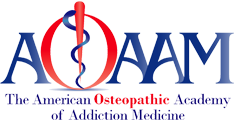Menu
Log in
General News |
The mission of the American Osteopathic Academy of Addiction Medicine is to improve the health of individuals and families burdened with the disease of addiction. |
Powered by Wild Apricot Membership Software
General News |
The mission of the American Osteopathic Academy of Addiction Medicine is to improve the health of individuals and families burdened with the disease of addiction. |
